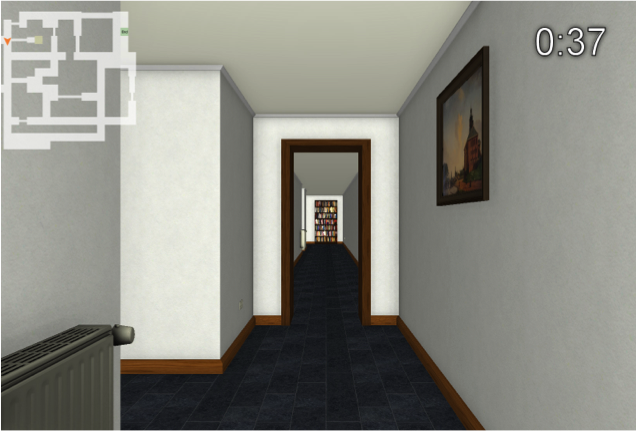Session Information
Date: Tuesday, June 6, 2017
Session Title: Therapy in Movement Disorders
Session Time: 1:45pm-3:15pm
Location: Exhibit Hall C
Objective: Investigate whether combined motor and cognitive training improves motor and cognitive function in people with PD and freezing of gait (FOG).
Background: FOG affects half of people with PD. There is a close association between FOG and executive dysfunction. FOG can be provoked by performing a dual-task. The mainstay of treatment is physical therapy but the cognitive association has directed attention to cognitive-based approaches. We recently showed that combined motor and cognitive training improves dual-tasking capacity in FOG1. We hypothesize that this training could improve FOG as well as overall gait in PD and potentially cognitive function.
Methods: We recruited 20 PD patients (13 with FOG) to perform a virtual-reality (VR) based intervention (eight 20-minute sessions stepping in place navigating a complex VR maze). The intervention also included a simultaneous cognitive task (modified Stroop test) which exerted additional cognitive load while stepping. Participants underwent cognitive and motor assessments before and afterward, including analysis of temporal gait parameters (stepping time, rhythmicity, symmetry) and reaction time to the cognitive task, all under single- and dual-task conditions. A modified Timed Up-and-Go test was also performed, in addition to standard neurocognitive tests.
Results: The intervention significantly improved motor and cognitive performance during single- and dual-tasks for those with FOG (dual-task stepping time, rhythmicity and reaction time as well as single-task stepping time). The modified Timed-Up and Go Test times for the FOG group reduced significantly after the intervention and the trailmaking test improved trending to statistical significance. There was a significant improvement in Question 6 of the New Freezing of Gait questionnaire (“How long is your longest freezing episode when initiating the first step?”).
Conclusions: A VR-based intervention combining motor and cognitive training in FOG showed significant improvements in motor and cognitive performance during single- and dual-tasks, improvements in cognitive flexibility, gait and self-reported FOG. The parallel improvement in gait and cognitive performance implies that combined training has effects on gait and possibly cognitive function as well as dual task capacity. However, larger randomized controlled studies are required.
References: 1Killane I et al. Dual Motor-Cognitive Virtual Reality Training Impacts Dual-Task Performance in Freezing of Gait. IEEE J Biomed Health Inform. 2015 Nov;19(6):1855-61.
To cite this abstract in AMA style:
C. Fearon, I. Killane, L. Newman, R. Beck, T. Munteanu, D. Birsanu, J. Butler, B. Magennis, R. Reilly, T. Lynch. Combined Motor and Cognitive Training Improves Motor and Cognitive Function in People with Parkinson’s Disease and Freezing of Gait [abstract]. Mov Disord. 2017; 32 (suppl 2). https://www.mdsabstracts.org/abstract/combined-motor-and-cognitive-training-improves-motor-and-cognitive-function-in-people-with-parkinsons-disease-and-freezing-of-gait/. Accessed December 29, 2025.« Back to 2017 International Congress
MDS Abstracts - https://www.mdsabstracts.org/abstract/combined-motor-and-cognitive-training-improves-motor-and-cognitive-function-in-people-with-parkinsons-disease-and-freezing-of-gait/

